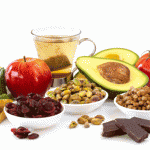The Secrets To Anti-Aging Foods: What You Need To Be Eating NOW!
 You’ve heard it on the radio, seen it on television, and read it in print; every day, health experts and food companies claim that a particular food or diet will “turn back” the biological clock.
You’ve heard it on the radio, seen it on television, and read it in print; every day, health experts and food companies claim that a particular food or diet will “turn back” the biological clock.
Such individuals attribute various benefits to the foods they promote, including more radiant skin, reduced disease risk, longer life, or an enhanced sense of vitality.
But how does one separate the hype from the reality?
Does diet really make a difference in one’s appearance or quality of life?
According to leading medical authorities and nutritional scientists, food does make a major impact. And you don’t need the latest “guru” to tell you which ones carry the greatest anti-aging benefits… you simply need to structure your diet to include a wide variety of nutrient-dense foods.
What Effect Does Diet Have On Aging?
The processes the body undergoes as it ages are varied and complex. Like any vehicle, what people put into their bodies has a significant effect on how and for how long they remain healthy. For better or worse, diet contributes elements and substances that either accelerate or delay the aging process. These include:
- Vitamins and minerals – People need a wide array of vitamins (from A through K) to regulate bodily processes and protect the immune system. Although supplements can help make up for deficiencies, vitamins and minerals are best absorbed by the body in food form.
- Inflammatory/anti-inflammatory properties – Flavonoids and polyphenols, the most common antioxidants, offset the “oxidative burden” placed on the body by environmental toxins and other factors, such as processed foods. Diets containing harmful chemicals, excess sugar, and other harmful components increase the burden.
- Calories – Everybody requires a minimum number of calories to sustain a healthy weight and carry out important tasks. Too many calories, however, leads to excess weight gain and conditions such as diabetes, heart disease, and cancer. These illnesses are the most common causes of early death in the United States.
What Characteristics Do Anti-Aging Diets Share?
All over the world, civilizations have adopted various types of diets based on their unique climates, agriculture, and cultures. From largely vegetarian menus in southern and eastern Asia to the gastronomic delights of Europe and the Mediterranean, people thrive on a wide array of foods. However, most of these diets share one or more commonalities, such as:
- Low calories – According to the National Institute on Aging, diets low in calories place lower stress on the body, resulting in longer overall lifespans. Although this does not mean people should deprive themselves, they should remain aware of how many calories they need to consume each day to maintain a healthy weight and strive not to exceed this amount.
- Plentiful produce – From lush Mediterranean diets to humble stir-fry, cultures enjoying the greatest longevity also serve the largest proportions of fruits and vegetables.
- Lean protein – Also common among cultures with longer lifespans is the tendency to serve smaller portions of leaner protein sources such as chicken, fish, and legumes. This reduces the burden on the digestive system to process excess fat and protein, which are not as easily metabolized as complex carbohydrates.
- Sufficient fiber – Whether loading up on whole grains, legumes, or fibrous vegetables, those practicing anti-aging diets understand the importance of soluble and insoluble fiber to improve digestion and nutrient absorption.
“Superfoods” with Anti-Aging Properties
A balanced diet containing all of the above elements will certainly bring you closer to a longer, healthier life. As you build your anti-aging diet, include one or more of these highly-lauded “superfoods” to increase its benefits, including:
- Blueberries – All fruits provide an abundance of vitamins and minerals, but blueberries sit at the top of the list due to their powerful antioxidant properties. Sprinkle them on cereal, over yogurt or granola, or include them in smoothies for a delicious and nutritious breakfast.
- Nuts – Walnuts, almonds, pistachios, and other nuts pack plenty of phytochemicals, along with unsaturated fats, vitamins, minerals, and protein.
- Chocolate – It’s not a myth! In its “dark” form, chocolate provides a plentiful source of flavonoids that keep blood vessels functioning effectively. The result is optimal blood pressure and lower risk of diabetes, heart disease, and other life-shortening conditions.
- Fish – When choosing protein, go with salmon or another healthful fish twice a week. The unmatched source of omega-3 fatty acids keeps heart rhythms normal and prevents plaque buildup in arteries.
- Sweet potatoes – These vibrant tubers contain generous amounts of vitamins A, C, and E, which work together to fight cancer-causing free radicals in the body.
- Spinach – Packed with vitamin C and iron, this dark leafy green should comprise a daily part of any anti-aging diet.
- Avocados – Slice them onto a salad or mix them into guacamole for a heaping helping of monounsaturated fat and biotin, which keep skin looking smooth and supple.
- Oatmeal – Start off each day with this valuable source of soluble fiber, which helps keep LDL (“bad”) cholesterol at bay.
- Tomatoes – The high levels of lycopene in these “vegetable fruits” help bodies fight off cancer, heart disease, and elevated cholesterol. They also block damage from UV rays, keeping skin looking younger longer. For the best anti-aging effects, enjoy tomatoes cooked.
No one diet or food exists to keep every individual healthy and youthful for many years to come. Fortunately, this means anyone can adapt their diet to provide anti-aging effects by adding the above superfoods. Try them today to learn how delicious an anti-aging menu can taste!
Sources:
http://www.nia.nih.gov/health/publication/metabolism-does-stress-really-shorten-your-life/does-how-much-you-eat-affect-how
http://www.webmd.com/diet/features/best-anti-aging-foods
http://www.eatingwell.com/nutrition_health/healthy_aging/7_anti_aging_superfoods?page=4
http://www.doctoroz.com/videos/anti-aging-foods-cheat-sheet?page=8
http://www.nia.nih.gov/health/publication/metabolism-does-stress-really-shorten-your-life/does-how-much-you-eat-affect-how
Category: Anti-Aging


